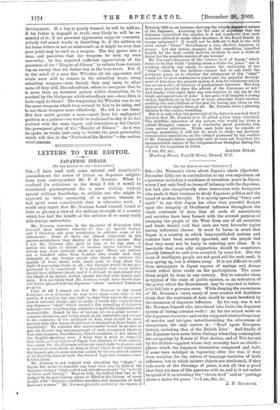LETTERS TO THE EDITOR.
JAPANESE IDEALS.
[TO THE EDITOR OF THE "SPECTATOR:1 Siu,—I have read with some interest and considerable astonishment the series of letters on Japanese subjects from your correspondent Mr. F. J. Norman. When he confined his criticisms to the Army I felt it would be considered presumptuous for a mere civilian, without special military knowledge, to criticise one who might be expected to write accurately of a system wherein he bad spent some considerable time in educative work. I could only regret that Mr. Norman found himself bound to take so gloomy a view of the military strength of a country which has had the benefit of the services of so many really
able foreign instructors.
Mr. Norman, however, in the Spectator of December 12th touched upon matters wherein he has no special license, and I therefore ask your permission to criticise some of his statements. Some of these are almost humorous in the narrow-mindedness they display of the writer's nature. May I ask Mr. Norman who gave to him or to any man or nation the right to dictate to another nation whether that nation may have national ideals or not? There are nations not a hundred miles from London who would look very strangely at any foreign people who dared to criticise the quality of their ideals even, much more to deny them the right of possessing ideals at all,—the thought would be too pre- posterous to be considered. It is inevitable that every nation should have different ideals, and it is difficult to understand why the ideals of an Asiatic nation should not deal with Asiatic sub- jects. It is not likely that Mr. Norman would have shown him- self better pleased had the Japanese " ideals " included European projects.
First of all, I cannot see how Mr. Norman or any casual foreigner, even although he may have spent some time iu the service of a nation, has any right to deny that nation the posses- sion of national ideals ; and secondly, I would also contend that any Japanese "ideal" which includes the spreading of Japanese influence over neighbouring countries is perfectly legitimate and unassailable. Bound by ties of history, of—to a great extent— common literature, and owing much in art, industries, and science to the countries of the mainland of Asia, what should be more natural than that Japan should seek to strengthen those bonds of friendship ? To consider this unreasonable would be at once to put out of court any encouragement of such recognised ideals as Pan-Americanism, Pan-Slavism, Pan-Germanism, or the union of the English-speaking race. I think that it must be conceded that those, not apologists of Japan, but admirers of that country, who claim for the Japanese nation an equal right to possess and to choose its own ideals, as long as these ideals do not transgress the bounds placed upon national action by the recognised canons of civilisation, have at least the force of logic and common-sense behind them.
Mr. Norman is not content with attacking the "ideals" of Japan, but seeks to demolish any hope that may be held of the Japanese being a " high-souled and chivalrous people " by "a study of their past history." Heaven help the nation that has to be judged by its past history alone, so filled is the history of every people with "intrigues, ruthless murders, and massacres of both men and women." Mr. Norman gives the murder of the Queen of Korea in 1895 as an instance showing the utterly depraved nature of the Japanese. Assuming for the sake of argument that the Japanese committed the murder, is it not wonderful that such monsters allowed so many other members of the Royal family to escape unharmed? It would not be difficult to find in the still more recent " Boxer " disturbances a very effective Japanese to quoque. Let any nation engaged in that expedition, impelled largely by the most sordid motives, hesitate to cast a stone at Japan for the possible murder of one woman ! Mr. Norman's discovery of the "cloven hoof of Japan," which seems to be that while "prating about a desire for peace" she is working silently but surely to secure the realisation of her " ideal "—Asia for the Asiatics—cannot fail to call forth the pertinent query as to whether the attainment of this "ideal" would not be more conducive to peace and the peaceful develop- ment of Asia than the present system of Asia for whichever nation can secure a slice of territory or predominant interests. Has Asia been more peaceful since the advent of the European, or not ? And finally, what right have any non-Asiatics to any say in the ideals and aspirations of Asia? I can quite well imagine a young cuckoo, hatched out in the nest of some reluctant foster-mother, scolding the real children of the nest for having any ideas on the subject oftheir rights there at all. Mr. Norman bears a pleasing likeness to the cuckoo foundling.
But it is only when the postscript of the letter is reached that I discover that Mr. Norman is to be pitied rather than criticised. The childlike innocence of any person who would lay down a cabled Shanghai rumour as a conclusive proof precludes him from serious criticism. While such faith may be capable of moving mountains, it will not do much to shake any previous preconceived convictions on the subject possessed by any readers of Mr. Norman's letter, especially such as have not forgotten the unimpeachable nature of the telegrams from Shanghai during the siege of the Legations in Pekin.






































 Previous page
Previous page